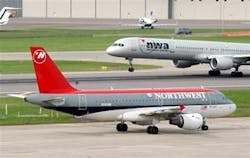Northwest Says Mechanics Talks Stalled
MINNEAPOLIS (AP) -- Northwest Airlines Corp. considers its seven months of contract talks with mechanics at an impasse and wants a federal mediator to release the company from further negotiations.
The mechanics have until June 8 to respond to Northwest's request to release them from mediation. Arbitration would be next, but either side can refuse. That would prompt a 30-day cooling-off period. After that, the mechanics could strike.
Mechanics have not decided whether they want arbitration, Jeff Mathews, contract coordinator and negotiations spokesman for the Aircraft Fraternal Mechanics Association, said Wednesday.
Faced with massive losses - $458 million in the last quarter alone - Eagan-based Northwest has been seeking to cut mechanics' pay by about 25 percent and lay off nearly half of them. Northwest pilots agreed to concessions last fall, but its other unions have resisted.
''AMFA remains unwilling to not only agree to any single meaningful labor cost savings proposal, but also refuses to acknowledge that such labor cost savings are necessary or appropriate,'' Julie Hagen Showers, Northwest's vice president for labor relations, wrote to the National Mediation Board.
Also Wednesday, the flight attendants union said Northwest will recall all 691 of its laid-off members over the summer.
Mathews said Northwest is moving too fast. AMFA resisted Northwest's requests to open negotiations early, instead waiting until the law required them to go to the bargaining table.
''They've been extremely impatient, and they don't want to allow us even minimal time to consider proposals,'' Mathews said. He said Northwest dragged previous negotiations out for years.
Negotiations with the flight attendants have also been tense. Professional Flight Attendants Association president Guy Meek said he believes Northwest is only recalling its members because it wants to ''cover any delays that may arise from labor problems.''
Northwest spokesman Kurt Ebenhoch said the recall is to cover anticipated staffing needs in the second half of 2005.
At other airlines, nearly every other union has granted concessions since 2001. But not at Northwest.
The nation's fourth-largest airline is seeking $1.1 billion in annual labor savings. It'll save $300 million a year because of the pilot agreement, which also included cuts to salaried employees. Northwest is proposing another $176 million in pay cuts for mechanics along with layoffs for more than half of them, the union has said.
Northwest's costs were higher than all the hub-and-spoke carriers during the fourth quarter of 2004. It cost Northwest 15.4 cents to fly each seat one mile - more than double Southwest Airlines' 7.6 cents.
''Their unit labor costs stick out like a sore thumb when you compare them to the other legacy carriers,'' Calyon Securities analyst Ray Neidl said.
The only deadline for the talks is Northwest's ever-shrinking pile of cash - $2.1 billion as of March 31. Neidl said he thinks Northwest's cash situation becomes critical in the fall, since Northwest will need cash either for the slower winter months or for bankruptcy.
Mechanics have had an up-and-down run at Northwest in the past 12 years. Like other Northwest workers, they granted major pay concessions in 1993 to keep Northwest out of bankruptcy. They won raises of about 25 percent in May 2001, but they've suffered thousands of layoffs since then.
Mathews said Northwest's proposed pay cuts would send mechanic base pay back below where it was even after the 1990s concessions, when it was $18.45 per hour.
The lack of progress has prompted Capt. Mark McClain, the head of the Northwest branch of the pilots union, to criticize the other unions for not reaching deals. He said workers can't just wish away high fuel prices and overcapacity.
Mathews and the flight attendants union have bristled at McClain's public demands that they take pay cuts.
''I'm not really sure why Capt. McClain has decided to interject his views into our negotiations. We sure as heck never inject our views into their negotiations,'' Mathews said.
The PFAA on its Web site has accused McClain of buying into Northwest's ''doom and gloom propaganda'' and said, ''What he calls 'painful' for his group would be just unlivable for ours.''
Similar fissures between the unions appeared in 1993, said Ben Hirst, who was Northwest's vice president for labor relations in 1993, and is now chief legal officer at Los Angeles-based KB Home.
''Ultimately, everybody's got to come together and agree on a plan, or the airline won't survive,'' Hirst said. ''And in 1993 that's the conclusion that the unions all reached, and it was the right conclusion.''
The PFAA has never before negotiated a contract with Northwest, and it has a lot at stake in these negotiations, said John W. Budd, who teaches labor relations at the University of Minnesota.
''They need to convince the people who voted for them that they made the right choice, and they need to win over the people who didn't vote for them,'' Budd said. And certainly no one voted for them to give tons of concessions. Workers can do that on their own.''
